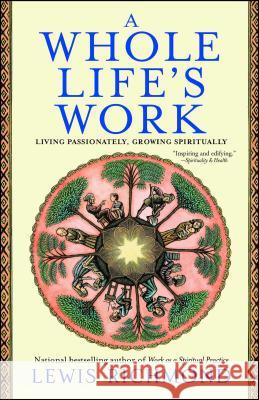A Whole Life's Work: Living Passionately, Growing Spiritually » książka
A Whole Life's Work: Living Passionately, Growing Spiritually
ISBN-13: 9780743451314 / Angielski / Miękka / 2005 / 256 str.
"Work is not just a job. It is the sum of all our purposeful activities. Seen in this light, work is our whole life."
-- from A Whole Life's Work
What is work in the truest sense of the word? For Buddhist priest and acclaimed author Lewis Richmond, work is more than just having a job, or a means to a profitable end. It is the key to cultivating inner life and contributing to the developing consciousness of all humanity.
In this companion to his national bestseller, Work as a Spiritual Practice, Richmond applies his Buddhist understanding to address what is perhaps one of the primary struggles of contemporary Western life: how to achieve a healthy balance between professional ambition and personal happiness. Here he adapts Buddhist categories of spiritual virtue in defining eight important modes of work the Earner, the Hobbyist, the Creator, the Monk, the Helper, the Parent, the Learner, and the Elder along with their corresponding eight modes of inner work: Precepts, Vitality, Patience, Calm, Equanimity, Giving, Humility, and Wisdom. How to internalize these modes of work, and lead a more meaningful and spiritual life, is what this groundbreaking guidebook is all about.
Whether we are professionals, artists, hobbyists, parents, students, or spiritual leaders, A Whole Lifes Work can teach us how to reconcile our outer livelihood with our inner lives...and reap the benefits of hard work well done.
What is work, truly? In its widest sense, work is not just a job. It is all our purposeful activities. Seen in this light, work is our whole life.Out of this idea, Lewis Richmond, author of the acclaimed book Healing Lazarus, brings us a new book that examines the eight important modes of work--the Earner, the Hobbyist, the Creator, the Monk the Helper, the Parent, the Learner, and the Elder--along with the their corresponding eight modes of inner work, which are Precepts, Vitality, Patience, Calm, Equanimity, Giving, Humility, and Wisdom. These inner modes of work are drawn from the authors Buddhist training, but in some form they can be found in most spiritual traditions, demonstrating the broad recognition throughout history that even when life was short and survival hard, our whole lifes work has inner as well as outer dimensions.Although the Earners work has been predominant through most of history, Richmond argues that to grow spiritually all eight modes of work are necessary. It is through these modes that our lives gain purpose and meaning, not to mention such vital attributes as spiritual virtue and practice. Put simply, A Whole Lifes Work provides its readers a roadmap for a practical as well as spiritual journey that melds outer livlihood with inner life, so that as we grow old we can look back and say: I did the best I could, what I did counted, I am satisfied.











